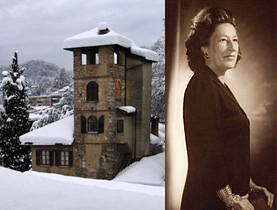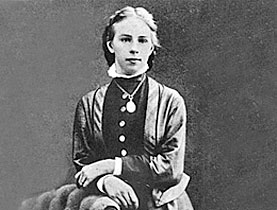Final bell rings for American schools’ founder

When 98-year-old Mary Crist Fleming died last month, she left a legacy in the shape of one of Switzerland's most elite boarding schools.
Eloquent, stubborn and charming, Fleming founded the American School in Switzerland (Tasis) in 1956 in canton Ticino. Its mission: to give Americans a strong education set in culturally rich Europe.
Today the private boarding school offers Advanced Placement and International Baccalaureate studies to more than 500 students from 51 countries, most of whom pay SFr64,000 ($54,600) a year.
School workers and family members say, however, that Fleming’s work never centred on money, and the school is now run by a non-profit foundation. Tasis, they say, is about making “world citizens”.
“She had a way of inspiring people, of teaching them that beauty and what you bring to the world are meaningful,” said Courtenay Mastain, who teaches English. “She believed that education is more than what you learn. It is about the kind of human you are.”
Fleming herself triumphed in the face of near bankruptcies, failed marriages and nagging sexism. Even death seemed unable to catch her. “She used to joke about if and when she died,” her daughter Lynn Fleming Aeschliman told swissinfo.
Ultimately it was her tenacity, coupled with her shrewd, sometimes abrasive, diplomacy that saw her school succeed.
By the time Fleming died, surrounded by her children, Tasis had become a SFr100 million multicultural institution with programmes scattered around the world. Some 25,000 students have passed through its halls, including Saudi princes, the sons of billionaires and Arnold Schwarzenegger’s daughter.
“She was a firm believer that the show must go on,” Aeschliman said. “So that’s what we’ll do.”
Pushing all the buttons
Fleming was born on September 10, 1910, to teacher parents who started schools in Pennsylvania. From early on she relied on her wit to outshine her physical “plainness”.
“My mother had hoped and prayed for a beautiful child, but I was anything but beautiful, then or now, with a very large nose that I ran after for 30 years before I could catch up and come to terms with it,” Fleming wrote.
She compensated with bright red lipstick, pearls and a demanding presence that sometimes ignited “spectacular fights” with her children, Aeschliman said.
Her earliest experiences of Europe came in the 1920s, when her parents sent her to Switzerland to study for a year. Her trips grew bigger and more ambitious as she blossomed into an adventurous young lady who loved white gloves and floppy hats.
In 1936 Fleming shipped a Ford convertible overseas and drove it for more than 15,000 kilometres across Europe with five schoolgirls at a time when women didn’t do such things.
They flirted with Mussolini’s officers, changed flat tyres in Yugoslavia and plied locals everywhere with a “drinking kit” that Fleming always carried with ice.
Once she broke down on a motorway in Italy and impatiently pushed all the emergency buttons on an SOS box, summoning a flotilla of repair trucks, police cars, ambulances and firemen.
“What’s wrong?” her rescuers asked. “I don’t know,” she replied. “That’s why I called you.”
Fleming said later that starting Tasis wasn’t that different: “You push all the buttons.”
Tasis takes root
Though she was twice wed, Fleming never found happiness in marriage and instead dedicated herself to education.
A Swiss man lured her to Locarno where she fell in love with the lakes. The school she opened there in 1956 had a dozen students, three of them her children.
Fleming nearly went broke in the process but the school caught on and in 1960 moved to its present location in Montagnola, a sleepy town above Lugano, where the author Hermann Hesse lived for more than 40 years.
Today the school is an rambling complex of dormitories, classrooms and assembly halls, each meticulously decorated. Medieval halberds and glaives hang in the dining hall. Fountains burble in courtyards. Buildings have tidy archways and swooping apses.
“Many of these buildings are protected and can’t be altered,” says Massimo “Max” Gygax, the school’s business manager who also teaches economics.
Over the following decades Fleming worked to open more schools in Puerto Rico and Britain, where a memorial service will be held for her.
“Being in Switzerland is a huge advantage,” Gygax said. “One student was amazed he could go out without his bodyguards.”
Today Americans make up about 30 per cent of the students. The rest are from all over the world: Brazil, Turkey, Russia. All are expected to travel – indeed tuition covers two major trips a year.
On their travels, students are to be ambassadors: smartly dressed, inquisitive and able to speak other languages.
“That was so important to her,” Aeschliman said. “She loved talking to anyone.”
Curtain call
A few weeks before her death, Fleming told Gygax she was tired and ready to go. Some of her last words were French, the language she loved most.
“She died at the start of a school day,” Aeschliman said. “I know that made her very happy.”
What emerged in the days afterwards were memories of a woman who had set her own rules and in the process touched the lives of thousands.
“The flower you have planted will flourish for many generations to come,” remembered Ronny Bigio, a student who graduated in 2001. “You have truly changed my life.”
Fleming’s body was placed in a casket draped with flowers and cedar fronds and set in a black carriage pulled by two black stallions. A light snow fell as her body was lowered into a grave next to poets and painters in the Sant’Abbondio cemetery, a short walk from the school.
It was a fitting finale for a woman who loved youth, drama and beauty, and who had dedicated her life to sharing the power of them all. Up on the hill, her greatest hopes and achievements had homework.
swissinfo, Tim Neville in Montagnola
Fleming was more than just an educator; she was a messenger of hope, love, understanding, compassion and life. She would hold our hand and lead us to the light. – Maya AlBaradie, class of 1997.
She was like a hurricane of enthusiasm, curiosity and love. At 98 she was still telling dirty jokes. – headmaster Michael Ulku-Steiner.
She was a fascinating lady. When she’d invite you over for dinner, you knew you were going to be there until midnight. – Keith Reimer, 11th grade dean.
She always had the right word for everyone. Her love and passion for intercultural communication is our heritage. – Melania Ancillotti Varola, class of 1973.
I had the privilege to go to Tasis for six years, the best days of my life. The world has become a little colder without her. – Annette Rossi-Roetger
Former US President George H.W. Bush wrote to Fleming on her 80th birthday.
Dear Mrs Fleming,
Barbara and I are delighted to send best wishes as you celebrate your 80th birthday.
What a remarkable life you have led – great in experiences and great in accomplishments! Your strong commitment to quality education has inspired your students to strive for excellence so that, by working hard and displaying individual initiative, they too can make a difference in the world. Yours has been a noble endeavour spanning nearly six decades, and I congratulate you on a job well done.
We join your family, colleagues and friends in wishing you a wonderful celebration, surrounded by the warmth of happy memories and secure in the knowledge that you have made this a better world.
In the late 1930s Fleming and five female friends drove for more than 16,000 kilometres across 13 European countries in two months. Here’s their packing list:
6 girls
1 ice pick
6 pairs of goggles
3 top coats
6 steamer rugs
18 handbags
3 cameras
1 carry-all for maps
1 radio
1 portable spotlight
1 first aid kit
1 medicine chest
1 case of baked beans
2 cases of tomato juice
1 fitted lunch box
1 portable stove
1 box canned fuel
1 ice basket
All of it had to be unloaded each time they had a flat tyre, and they had at least 12 flats. The first took them four hours to fix. The last one took 20 minutes.

In compliance with the JTI standards
More: SWI swissinfo.ch certified by the Journalism Trust Initiative














You can find an overview of ongoing debates with our journalists here . Please join us!
If you want to start a conversation about a topic raised in this article or want to report factual errors, email us at english@swissinfo.ch.